
 Jazz At Sunset |
|
Hai Rezolution's Dwight Brewster and Sherry Scott,
Mr. Brewster has played with Willie Colon, Rick James and others. |
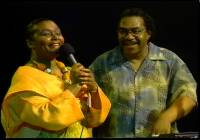 |
TH: I think reinvention is a good word.
...
TH: So, Hai Rezolution, Afro-Caribbean jazz. ... So, [at your show] they have dancing?
DB: Yes, it's hidden, but we have a dance instructor, because we have a lot of people who love to mambo, they just don't know how, but when they found out that that's available, they seemed to be showing out.
SS: But we also are magnetizing a lot of the old um...
DB: Palladium crowd
SS: ...Palladium crowd. A lot of the African-Americans have started Mambo back in the '50s, and loved to mambo and mambo two or three times a week, but at that time they had to dance to predominantly Spanish music. One of the things that is exciting for Dwight and I is because he was raised on the latin side of the music, but I was raised on the jazz side of the music, and what we did was we put his latin sensibilities with me singing R&B and jazz standards, so that when the African-Americans come, they usually hear latin music to mambo to, now they can dance to their favorites, you know...
DB: but still do the Mambo. ... "The Funky Nassau"
SS: "The Funky Nassau", so it's kind of created something new that's really old, but it's current and it's bringing a new crowd to the dance floor that had been a forgotten crowd, and that's the African-Americans. And in New York there are thousands of African-American Mambo dancers. So, this is really been kind of an exciting adventure and I have to say that it came about naturally, it wasn't a planned thing. You know, it was just something that we just do, and we did it and we said...
CS and DB together: ...Wow! [laughter]
TH: So now I want to mind your business a little bit. Are you two married, are you partners, I mean how did you two guys get together?
DB: We're partners and we're married.
TH: Oh you are, this is a husband and wife team?
DB: Yes, it is.
TH: How'd you come together?
SS: Actually I was living in New York in the middle '80s and Dwight's record company and production company contacted me and were interested in doing a CD with me and giving me a contract, and we did and I went to Florida and we recorded and we just found that we had a very wonderful synergy in terms of creating music together and working together. Dwight had a lot of young artists that he was producing and managing at the time and I just kind of fit into the slot as the female part of that, and for fifteen, sixteen years we did that. We knew each other's families and kids and everything, and there just came a time when he was single and I was single. We were talking about what we wanted in a mate, and he was like, "yeah you know, like somebody..."
CS and DB together: "...like you!"
SS: And I was like "yeah, you know, like..."
CS and DB together: "...somebody like you! Whoa!!" [laughter]
DB: How did we get here?
SS: And here we are!
TH: We need to write that song "Somebody Like You".
DB: Yes, we're working on that.
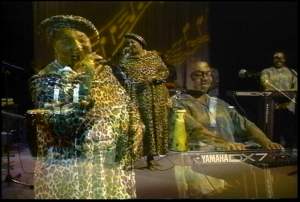 |
TH: I think that's fantastic,
DB: Right, that's what we did. We're very lucky.
TH: fantastic, and to be able to make music together.
DB: Oh yeah. You see me grinning. You can look at the tape.
TH: I know.
DB: I'm happy as a [?].
SS: And we both have a love for teaching and dealing with young people. We do a lot of things for the schools, but we magnetize a lot of young people around us, and we're pretty balanced. I mean, we're like a mother/father to a lot of young people, in the sense that we're there to give them the information, we're there to help them be educated about the business of music, because a lot of young people think it's just about, you know, putting the gold on and getting clean and just singing to the track and it's about so much more than that. So, we're really trying to give them a foundation that will allow them to move through the industry in a business-like manner too. It's no good to get raped or robbed.
TH: Uh huh.
SS: That's not a good feeling.
TH: No.
SS: So, you have to get past the fact that "well, I just want to be an artist, I don't want to deal with the business". Well, you have to deal with the business.
DB: ...business. This is 2000.
TH: Because to protect your life.
SS: Exactly. And to protect your creations.
DB: Let me. I'm going to add this too. That means you must be computer-literate in this market. We've got a smorgasbord of computers on a network working in our facility right now. And people say "well, I don't know if I want to be in computers". Forget about it, I mean, if you don't have an email address, come on America, step up to the plate!
TH: Absolutely, in our community it is very important that we become apprised of the technology, because the technology is what the world exists upon.
SS: Exactly, and we currently have about seven websites.
...
www.incrediblebooking.com - Hai Rezolution info
3rdworldmusic.com - Dwight Brewster's site
peaceandlove4all.com - Sherry Scott's site
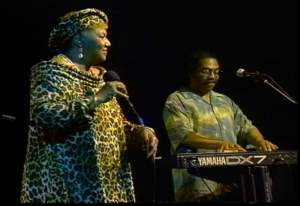
(TH): What do you see the future of Hai Rezolution being?
(DB): Well, actually Hai Rezolution has been designed from its inception to be the crossover band at a world music concert. So, if we have all Africans from Ghana, and they come in, but they're going to play in America, we're the perfect act to have on the show. If you have a salsa show, or we're also looking at Reggae Sunsplash where they say we have one day where we do Caribbean music from around the world, they've got to call us. Once they know about this group they've got to call us, because the people want to dance. I always found it very positive to have music that made people's feet move. And if we could play jazz, which has been in my opinion institutionalized, and it's very difficult to find new jazz music because it's not promoted properly. The record companies, in their present configuration, would much rather sell an old Miles Davis than develop a new artist. So, you have to have something that's compelling in order to change those rules. Hai Rezolution exists for that.
TH: And the audience is what makes that possible?
DB: That's correct.
TH: Word of mouth, and the appreciation. Does Hai Rezolution have a CD?
DB: We're working on it right now. It's about 3/5 complete.
TH: How many songs will be on it?
DB: The extended play will have five cuts, the full LP will have ten.
TH: So when do you expect that it will be ready for fans?
DB: We're looking to have it available in September, in the fall.
TH: You're recording in your own studio at this time?
DB: Yes we are.
TH: Dwight, I want to talk about you as a producer and a person who is so technologically apprised that I'm...I'm really in awe of you, actually...
DB: Uh, thank you very much.
TH: ...because I've had the privilage of seeing your operation, and how you put all of this stuff together. When do you find time, between the keyboards, writing songs, producing and working with all of the maniacs that I know that you worked with?
(SS): You know what, I'm going to answer this for him, because I've also been in awe of him for many years. But Dwight is one of those extraordinary people that has a level of energy that has allowed him to be the master of many things, but all tied in. He's one of the best producers that I know, and he is technologically knowledgeable about the original analog mixing board, so transferring that knowledge from the analog to the digital was not hard for him, but it was something he wanted to do. So he invested the time to do that, just like he invested the time to become, I mean, Dwight was the first producer I ever worked with that used the computer, and that was back in '84, and that was not a common thing at that time.
So he invested the time to be able to bring himself technologically to this time and he's always had the ability to learn and to teach himself and to create that avenue for himself by being very focused about where he wants to go, where he wanted to take it. Hai Rezolution is a direct result of that, because he and James Taylor and Skip Greene and a couple of the other guys, they were together many years ago, so this is kind of like a culmination of the dreams and the work that they put in years ago to bring it up to date. Adding my ingredient which is the jazz ingredient, because I know nobody's ever heard "I Remember April" in mambo time, but yet it works. That bring us to what he's created now, and Hai Rezolution is like a workhorse. That is the band that not only will nuture us, but we have a few other young singers who are coming on board that we're nurturing.
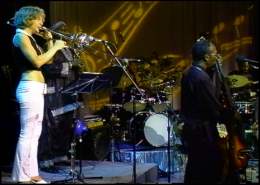 |
DB: We're showcasing them too.
SS: Exactly. And we hope to showcase quite a few young people in the context because they've got to be able to learn this format as well.
...
DB: ...in Hai Rezolution...we have a 10 piece band. It fluctuates a little bit. ... We also have a few guest artists, but our main guest artist is Sherry Scott. If I don't say something about her, I got to sleep with her late at night, you know how that works. [to SS] Let my throat go, honey please!
Ray Gregory(RG): So you see her as a guest artist, she's not exactly...
DB: Well, it's just to keep the dynamics of the band going. ...
TH: Sherry has a jazz career of her own.
DB: Yeah, and we didn't want to diminish that at all. The guys in the band, I started with James Taylor with Willie Colon, that was our first act. We were on Willie's first couple of records, so we were actually signed to Fania records when salsa was invented. I wanted to get that in.
SS: Well, I also want to clarify the fact that when Willie Colon and Joe Santiago--Joe Santiago told me the story. Many people thought that Dwight joined Willie Colon's band. It was Dwight Brewster's band that Willie Colon came to and auditioned for and became a member of, but when it went to Fania, because Dwight was African-American and not Puerto-Rican or Cuban, they changed it.
DB: And that's the truth.
SS: But that credit belongs to him.
TH: But Fania was a latin label.
DB: Yeah, but I'm going to be honest. It was Jerry Masuchi and Johnny Pacheco. I'd like to clarify, this is on my website. They told me that they paid me off and asked me to leave the band because they wanted me to go on and play "your kind of music". That's what they told me. "Go play your kind of music." "What do you mean, my kind of music? This is just as much mine as yours." "Not this company." And if you--and yes, I'm calling it what it is--do you see any black people signing to Fania records? No. You never did, because they didn't sign black artists. It didn't matter if you were Spanish, American, Brazilian, no. And there were some talented people who were Afro-American.
OMC: ...skin tone...
DB: Yeah, they were into skin tone!
SS: That's why I really want to get that clear, because Dwight deserves the credit due to him. He was one of three African-American piano players that was trained by Charlie Palmieri.
DB: And that was my teacher. That's how I started.
RG: "El Gigante"
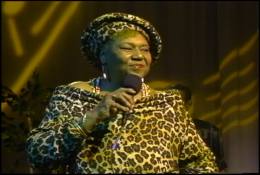 SS: So that credit is due because he has continued to fulfill that legacy. He has continued to stand in that place where "this is the music that we all have been given".
SS: So that credit is due because he has continued to fulfill that legacy. He has continued to stand in that place where "this is the music that we all have been given".
DB: It wasn't a Cuban music or a Puerto Rican music, it was African music.
SS: It was an African-rooted music, period.
DB: And as an African-American, I'm qualified to play it.
More material including Sherry Scott, Dwight Brewster and Tamm E. Hunt is upcoming in the near future.
Jazz at Sunset video show
producer & technical director
Orlando A. McAllister
Jazz at Sunset
Brooklyn Zone
Copyright © 2002-2004 BrooklynZone.com
BrooklynZone.com is not responsible for the content
of it's contributors.
BrooklynZone.com and OMC are not responsible for statements made by interviewed artists.